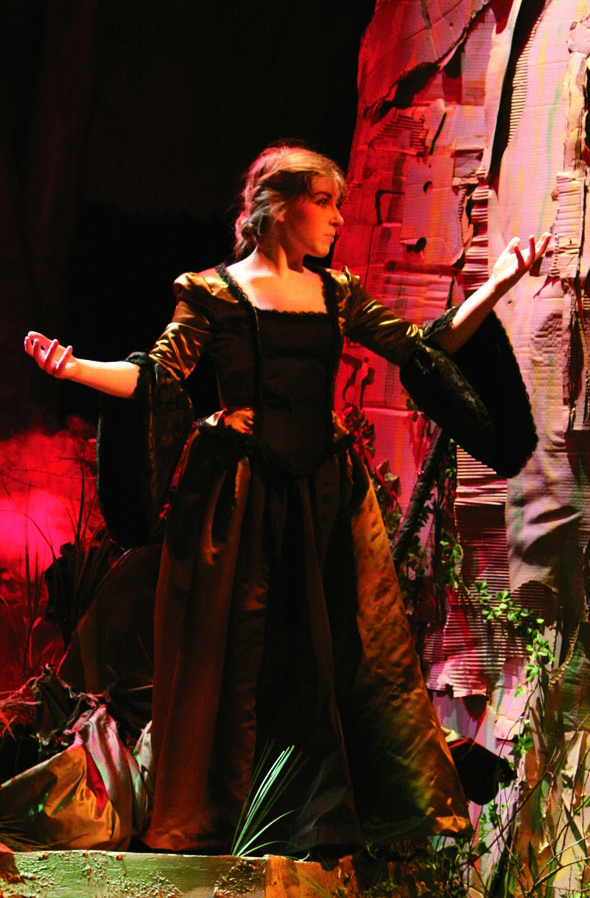A hectic senior year points to overseas medical studies
By Maggie Pelissero
Talon staff writer
When asking a high school senior where they desire to attend college the following year, many will reply with “somewhere warm” or “a place where I can hit the slopes,” however, senior Alex Peterson has a different answer. Peterson flew thousands of miles across the ocean for interviews at British medical schools this year. She also flew to England during this past summer to work. Few classmates have been able to keep track of this busy senior.
 The long, strenuous journey began this last fall for Peterson when she decided to apply to four medical schools in Great Britain: Nottingham, Newcastle and Cambridge in England and Aberdeen in Scotland. The process began with writing one personal essay. This essay had to reveal not only who she is but also why she wants to study medicine-and why she feels she’s qualified. While most seniors were just beginning the college application process this fall, Peterson’s entire application had to be completed by Oct.15.
The long, strenuous journey began this last fall for Peterson when she decided to apply to four medical schools in Great Britain: Nottingham, Newcastle and Cambridge in England and Aberdeen in Scotland. The process began with writing one personal essay. This essay had to reveal not only who she is but also why she wants to study medicine-and why she feels she’s qualified. While most seniors were just beginning the college application process this fall, Peterson’s entire application had to be completed by Oct.15.
Although the British college application process is very different from that in the U.S., it seems to be more efficient according to Peterson and her family. Peter Peterson, Alex’s father, felt that “although the UK system advances students more quickly than the U.S. system, 18 is pretty young to make a choice about a career.”
He also added that he “thought she was being innovative, ambitious, and a little daring” when she applied to the medical schools that were located so far from home. Peterson applied through the UCAS (Universities & Colleges Admissions Service) system.
After the application came the admissions test-the UKAT, a medical school specific clinical admissions test.
This test consisted of verbal reasoning, quantitative and decision analysis, and abstract reasoning. Peterson studied for the UKAT in late summer and early fall, even bringing her review book to restaurants and parties. She’s sure she even had it in her purse during the Homecoming games.
“I got a whole book. I studied for a month-and-a-half, and one morning I just went into this random testing center in Bloomington, by myself, in a room, with my i.d,” said Peterson. “I sweated bullets over this.”
She had to obtain a certain threshold score, and if she didn’t reach it, the Britain colleges wouldn’t even consider her application.
The British admissions tests are more academically focused than in America.
“I had to get 5’s on my AP Chemistry, AP Biology, and AP Calculus or AP Physics or else they wouldn’t give me an offer,” said Peterson. “All my extra-curricular activities didn’t even count. Acting? They didn’t even want to hear about it in my application. None of that matters,” said Peterson.
Interviews
After entrance tests are completed and qualifying scores are earned, the school may call for an interview with the student if they were interested. Since mail is extremely slow coming from England, Peterson received word, by mail, that three of the four schools she applied to wanted interviews. After looking at her calendar, she realized she needed to find a flight and leave in two days. She quickly booked flights using frequent- fliers miles, packed and headed to England.
Peterson spent the first two weeks of December, staying at her uncle’s house, in a small village in Wyre England, Poulton-le-Fylde, part of the time. After interviews, Peterson stayed at a hotel overnight, by herself, in the city that she was currently in. She spent a great amount time on trains traveling to the interviews, and even wrote her “Student Showcase” piece, which she produced in January at Minnehaha, on a train.
The interviewers gave Peterson ethical situations and asked for her to give a balanced response. The oral exam was “mentally taxing,” said Peterson. The exam consisted of questions such as, ‘If a fourteen year old girl came in, pregnant, and wanted an abortion, what would you do?’
Peterson emerged from this rigorous process with offers from both Nottingham and Newcastle. Newcastle, in northeast England, is only legally allowed to accept 19 international students and therefore it was a huge honor to have been accepted.
“When I went to Newcastle I didn’t know I wanted to go there,” said Peterson. “I was still interested in Harvard, Yale and Stanford. But I got there and I realized I really want to do this, and I really want to be in this place.”
After a successful interview, Peterson realized that Newcastle was going to be the perfect fit for her. She feels her excitement growing everyday upon her impending move to Great Britain.
Internship
For two-and-a-half-months this past summer, Peterson was living on her own in a basement apartment in London. She was lucky to receive an internship at an inner city clinic, where high school students are rarely accepted. She was a receptionist and performed tasks a student intern would. She also sat in on small group tutorials at the teaching clinic she was doing her work experience at.
“I showed up on the first day and no one knew I was going to be there cause the guy who was supposed to tell them forgot. So, I showed up and said ‘hi I’m the new student whose going to be working here for the next three weeks,” said Peterson. She had 12 hour work days, 7 a.m. to 7 p.m. She became very independent during this time and realized if she was going to pursue her dreams of being in the medical field, a dream that materialized when she was 12 years old, it was not going to be an easy task. Her mom had already been through this process since she attended medical school in Great Britain at University of Sheffield in South Yorkshire, England.
On the first day working at the inner city clinic, Peterson said, “It was crazy. I was in this other country, by myself and I couldn’t find the place. I was an hour late cause I had been walking through the country. It was a bit of an adventure.”
However, despite the daunting task of applying to and being accepted to medical schools in England presented, her parents have been extremely supportive after the initial surprise of her decision to attend school there. “She researched the requirements and took it upon herself to register for all the required testing,” said Alison Peterson, Alex’s mother. “At that point I knew she was determined, motivated, and had done her homework.” Her parents helped her practice interview questions and were patient when dealing with her constant stress.
There will not be a tremendous amount of time for Peterson to have other activities besides school.
“I’m not 100 percent sure what I’m getting myself into so I’m going to feel it out [the academic side of things],” said Peterson.
New Schedule
She will have classes from 9 a.m. to 5 p.m. everyday and will be going into clinical physiology and anatomy right away. However, eventually she will get involved with a “society,” the name for clubs in England.
She doesn’t plan on getting a job or an internship right away since financially it works out better for her to attend school in England than in the United States since she was offered a scholarship and will be able to get a degree quicker in the UK .
“Alex will get a medical degree in five years, so she will save three years of graduate training and quite a bit of money,” said Peter Peterson.
Although communication will be difficult with family because of the 6-hour difference, text messaging is free and there’s always Skype.
“When my sister is getting up I’ll be in the middle of classes. When my parents get done with work, it will be the middle of the night here,” said Peterson.
The decreased amount of communication with home won’t be the only big change she faces. The learning and teaching style in England is also quite a bit different.
Her father believes that although Alex has grown accustomed to the English customs (since her mother is from England and attended medical school there), she is still going to experience a “culture shock.”
There is much less interaction and students must learn to be more polite than casual with professors. As far as a different learning style goes, Peterson explained, “There will be not tolerance for abstract thinking. You either know how the heart works or you don’t.”
Pretty intimidating.
Despite all the challenges that Peterson will face, there will also be great changes for the better. She will attain more international experience, have more access to other countries, have less debt, and graduate in five years with a MBBS (Bachelor of Medicine, Bachelor of Surgery) degree.
Her mother agrees.
“I think she will gain a tremendous medical education in a system with a local and global emphasis,” she said. “I think she will graduate with far less debt than the average US medical student which will free her to go anywhere and pursue any field of medicine she truly wants, without worrying about how quickly she can pay back her loans.”
After her graduation from Newcastle in five years, Peterson will work as a junior doctor (one who graduates with a medical degree but remains in postgraduate training) for two years, then decide on her specialty and study for another three to five years.
“I haven’t been exposed to all the areas of medicine so I couldn’t make a final decision on that [her ideal career],” said Peterson. “I’m really interested in primary care because I enjoy working with people and I enjoy the challenges that primary care poses. You work with everybody on everything. You’re not just sitting doing cuts in the same place everyday.”
Changes
Newcastle University will be Peterson’s home for the next five years and her mom plans to take time off work to bring her out to school mid-September.
She will be living in a flat, which contains six single bedrooms, a small living room and kitchen, as well as five other medical school students.
She is going to be cooking her own meals and said she plans to “raid” her grandma’s house for pots and pans.
Although it is an exciting time to be independent and live on her own, she is saddened by what she must leave behind.
“I wont be able to bring my grandpas old chair that’s in my room or a lot of books because the airlines wont allow it.”
Peterson also adds that her parents are sad that they wont be able to both drive her out to college after loading stuff up in the “family pickup.” Then there’s the little things she mentioned she will miss such as not being able to get good coffee for the next five years
“I’m nervous about the huge change that next year will be, especially after 13 years at MA,” she said, “But I think we all are, and in the end, we’ll muddle through.”

